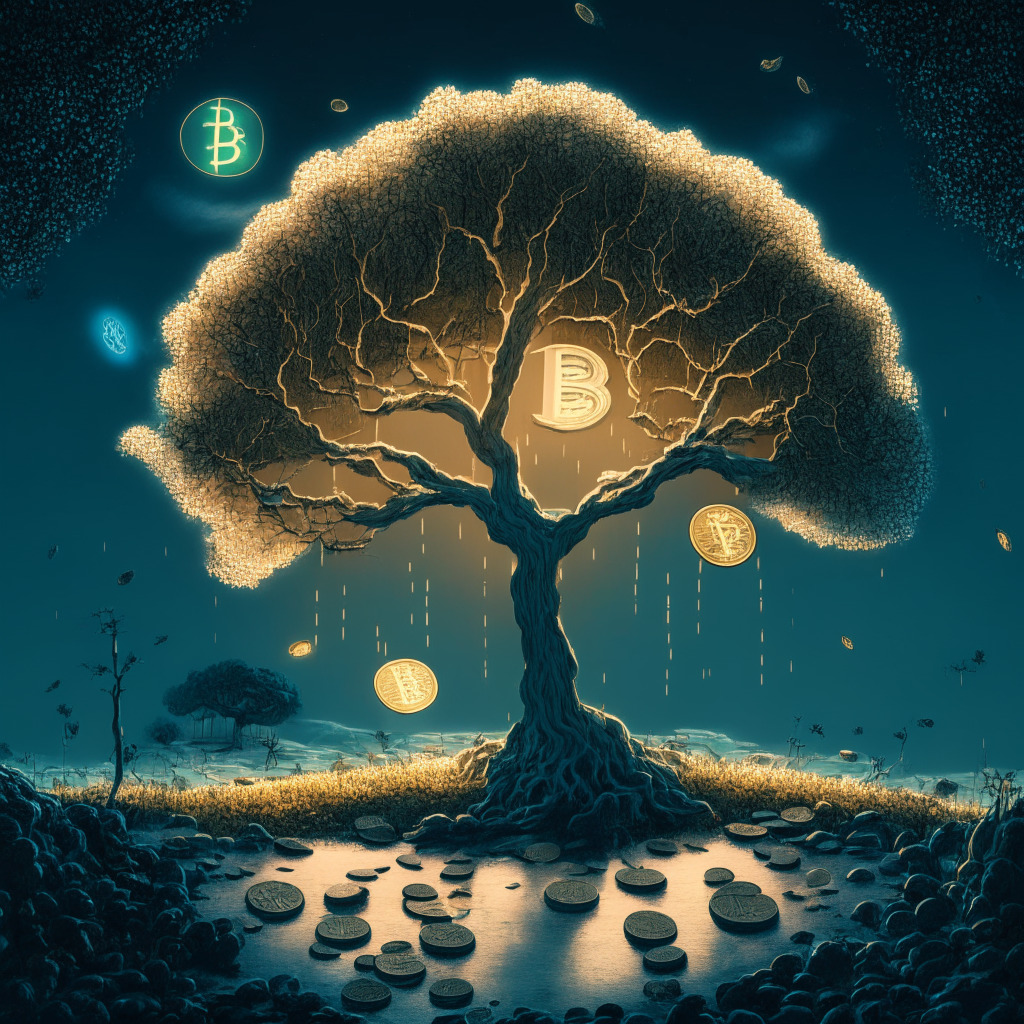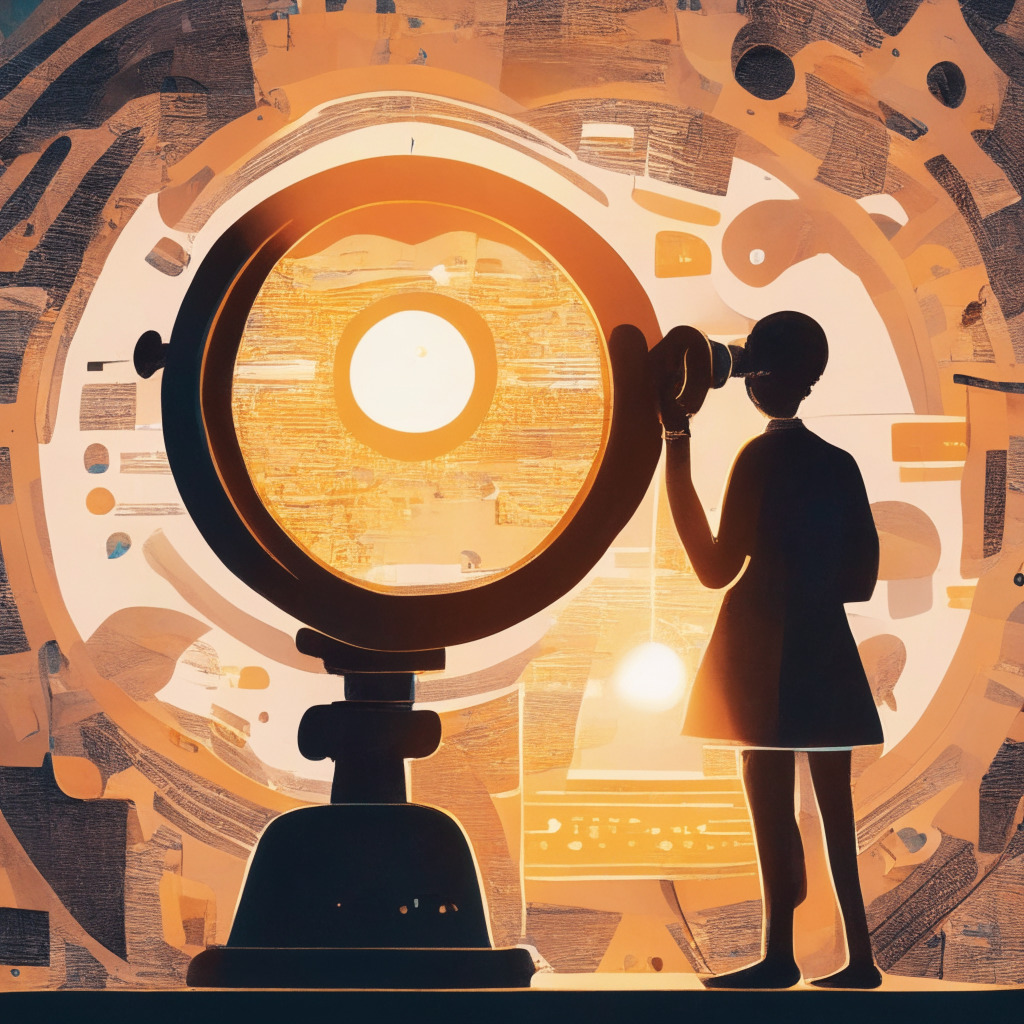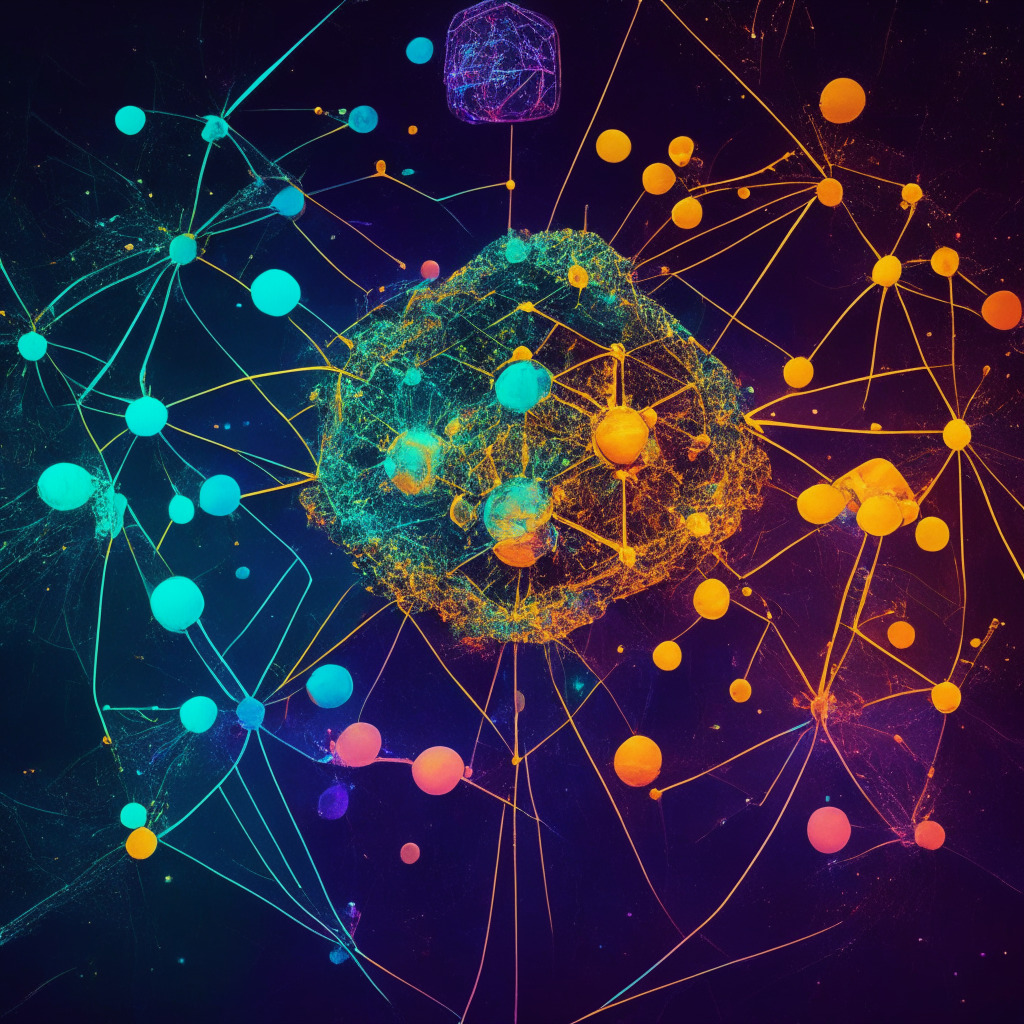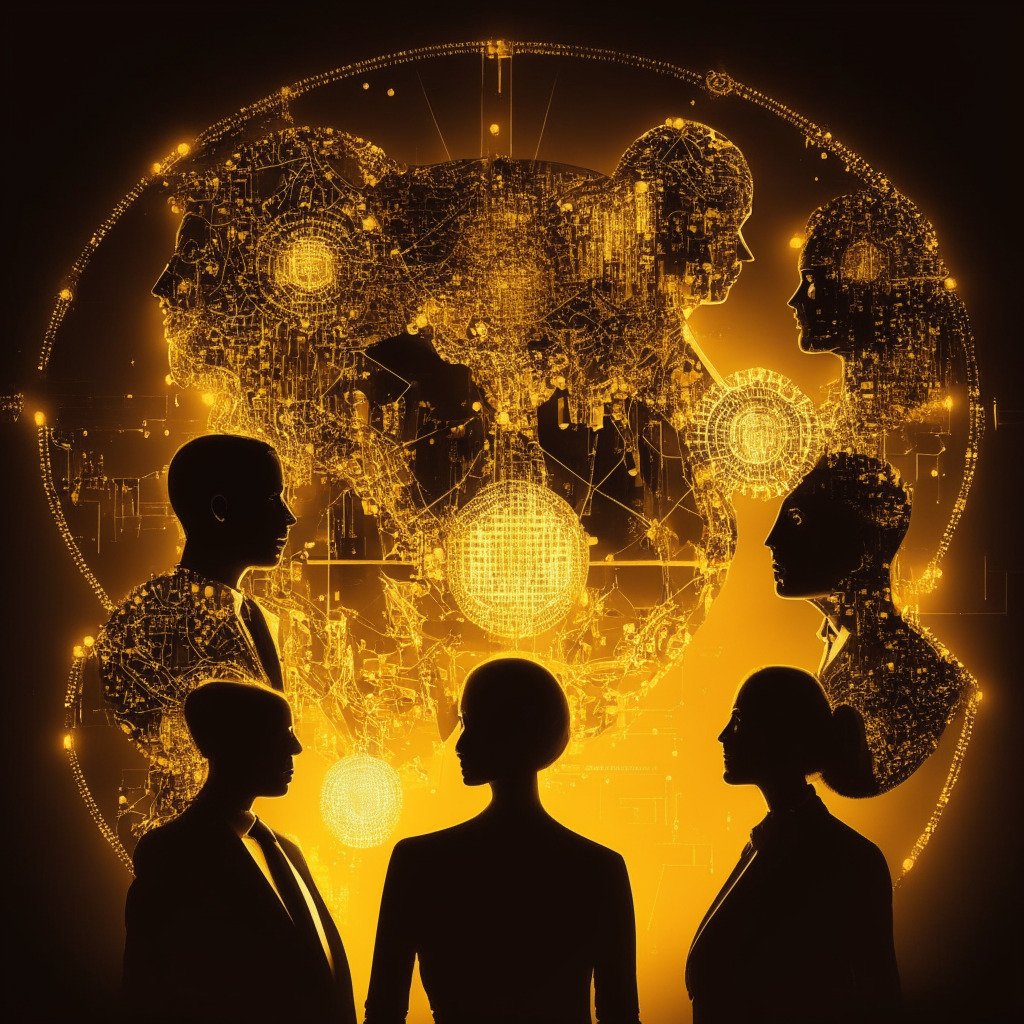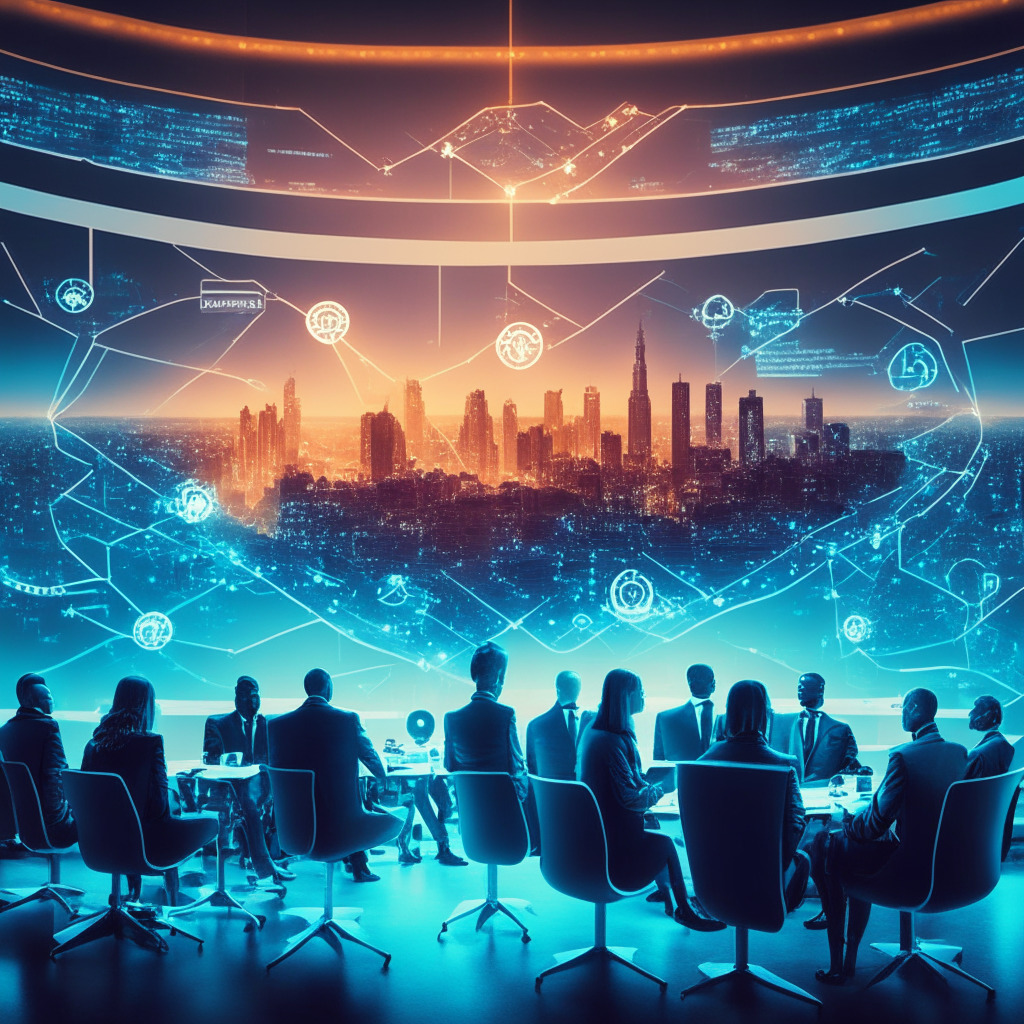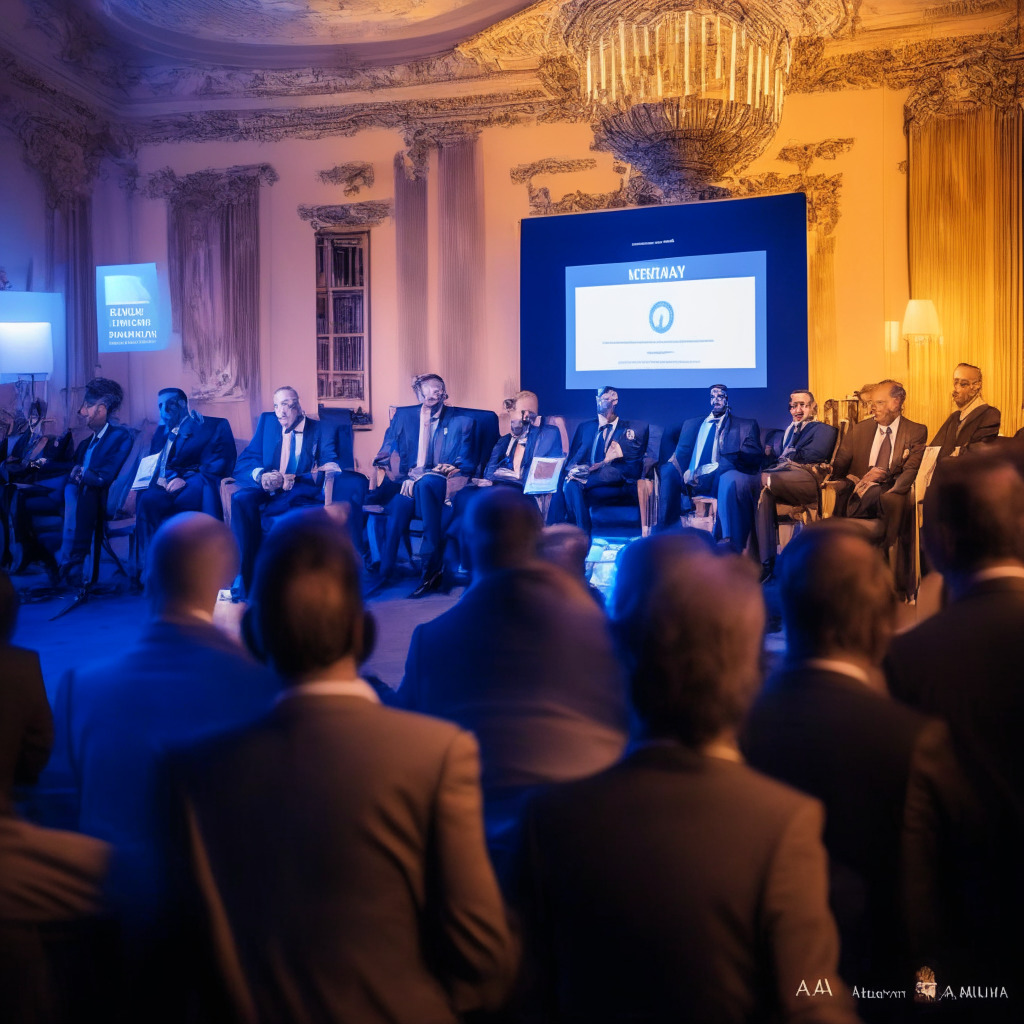Blockchain security was recently challenged on a rebranded social media platform, with numerous scam accounts launching under the Worldcoin banner. These counterfeit accounts shared devious links, jeopardizing users’ security. Despite this, Worldcoin continues striving towards its goal of differentiating real people from bots.
Search Results for: Sam Altman
Optimism Surpasses Arbitrum in Daily Transactions: The Tale of Two Blockchains
“Blockchain layer-2 Optimism surpassed Arbitrum in daily transactions, largely thanks to the emergence of Worldcoin. Despite Optimism’s transaction rates, it trails in daily active wallets compared to Arbitrum. The competition between these two demonstrates the evolving nature and diverse directions of blockchain technology.”
Navigating the Tempest: Unraveling BTC’s Bearish Cycle, Regulatory Uncertainty, and Novel Crypto Projects
As Bitcoin hobbles into a bearish cycle breaching a solace sight unseen for a month at $29,000; investor anxieties increase in light of the Federal Reserve’s impending rise in interest rates. Crypto markets fluctuate alongside the scrutiny of novel crypto projects and potential repercussions of regulatory uncertainty, illustrating a web of factors shaping the crypto industry.
Worldcoin: The Hybrid of Blockchain and Biometrics Faces Upcoming Regulatory Scrutiny
UK’s data regulator intends to probe into OpenAI’s cryptocurrency initiative, Worldcoin, which merges blockchain with biometric identification. Amid its success, concerns surface over privacy and the robustness of its identity verification system. The project, which reaches a milestone of two million sign-ups, faces inevitable comprehensive investigations by regulators worldwide.
Altcoins Overshadow Bitcoin: Worldcoin’s Rise and Future Sustainability Concerns
“The crypto market sees a shift as altcoin dominance rises and Worldcoin’s WLD token enjoys a 30% uplift on its first day. Despite early success, concerns of real-world privacy and centralization persist. While Bitcoin’s volume dwindles, trend reversal notices investment flowing into smaller entities like Ether and Ripple’s XRP. Despite setbacks, resilience and innovation in the industry remain hopeful.”
Unveiling Worldcoin’s Orb: AI, Cryptocurrency, and the Battle for Biometric Data
“The Orb, a device by Worldcoin, verifies human identity through iris scans, as part of a vision to distribute universal basic income via cryptocurrency as AI evolves. Concerns center on biometric data use, data security, and significant societal shifts.”
Unmasking Worldcoin: The Juxtaposition of Privacy, Centralization, and Digital Identity
“The launch of Worldcoin, a blockchain platform promising identity privacy through an iris scan, is sparking debate around privacy, centralization, and global identity. Critics argue the project’s centralization and handling of sensitive data presents substantial risk. As blockchain evolves, grappling with these issues will intensify.”
Unfolding Crypto Dramatics: Bitcoin’s Downturn, the Rise of Meme Coins, and The Debut of Worldcoin
The crypto market sees a significant downturn with Bitcoin facing a 1.92% dip. Despite the volatility, investors remain optimistic. Surges in ‘meme coins’ highlight profitable possibilities in the middle of the Bitcoin and Ether’s low volatility. Meanwhile, Worldcoin makes its debut with a notable 62% surge and the practice of spread trading prompts interesting tactics amongst traders.
A Rough Patch in the Crypto Realm: The Dip in VC Funding for Web3 Startups and the Rising Hope
Crunchbase reports indicate a 76% drop in funding for Web3 startups from VC funds in Q2 compared to last year. This year’s tally stands at $3.6 billion, a 78% downturn from 2022’s $16 billion. Despite this drop, AI startups continue to attract investors, while certain Web3 initiatives manage to secure impressive funding amidst the downturn.
Eyeball Scanning for Cryptocurrency: An Insight into Worldcoin’s Innovative Yet Controversial Venture
Worldcoin’s project World ID, a “global digital passport,” is gaining popularity, with 2 million sign-ups achieved in record time. This system rewards users with cryptocurrency for uploading their iris data. Despite potential privacy concerns, other protocols like Okta’s Auth0 and Talent Protocol have integrated World ID into their processes, endorsing the project’s credibility.
Unfair Practices or Unjust Scrutiny: FTC Probes into OpenAI’s ChatGPT and Its Implications
The Federal Trade Commission is rigorously investigating OpenAI’s ChatGPT, an AI conversation bot, for potential “unfair or deceptive privacy or data security practices”. This scrutiny raises questions about OpenAI’s privacy and data security protocol, and hints at possible financial penalties if any infractions are found. The tool’s undeniable potential is offset by significant ethical considerations and potential for misuse.
Worldcoin’s Vision: Universal Basic Income for All via Blockchain, A Revolution or Risk?
Worldcoin, a San Francisco-based Web3 initiative, stands out with its audacious goal of delivering a universal basic income to everyone on the planet, leveraging cryptocurrency. They’ve created a device, “The Orb,” designed to identify genuine humans from AI-generated duplicates by scanning the human eye. They aim to distribute wealth generated from a future advanced AI-driven world equally. Despite privacy and regulatory concerns, Worldcoin’s ambition illustrates the potential of blockchain technology for social change.
GPU Shortage as a Catalyst for Web3: How Decentralized Infrastructure Networks Benefit AI Startups
The GPU shortage could accelerate the adoption of Web3 by mainstream thanks to decentralized physical infrastructure networks (DePIN). Protocols like Akash, enabling GPU leasing to AI start-ups, and Arweave, offering permanent data storage, could help alleviate resource issues. DePIN could provide inexpensive, reliable infrastructure for startups, shielding them from AI threats and offering advantages over Web2.
Unraveling Worldcoin’s Revolutionary Biometric Protocol: World ID’s Pros and Cons
Worldcoin’s new identity protocol, World ID, leverages top-of-the-line biometric technology and a unique iris scanner to generate cryptographic identities securely. Integrated with Okta, the new “Sign in with Worldcoin” option offers enhanced privacy via zero-knowledge proof. However, concerns rise about potential misuse of personal information.
AI and Crypto Synergy: Unlocking Transparency, Decentralization, and User Control
The integration of AI and crypto has the potential to revolutionize both industries, fostering greater transparency, user control, and decentralization. Industry insiders suggest that AI could open up new opportunities for the blockchain sector, driving its resurgence and bringing additional real-world use cases.
National AI Commission Act: Balancing Innovation and Consumer Safety in AI Development
The National AI Commission Act, introduced by U.S. lawmakers, aims to establish a regulatory framework for AI technology by bringing together experts, government officials, industry representatives, and labor stakeholders to provide effective AI regulation, addressing concerns and potential risks associated with AI development and use.
Biden’s AI Summit: Balancing Innovation, Regulation, and Blockchain Implications
President Joe Biden is set to meet with AI experts to discuss the future of artificial intelligence and the need for legislation and guidelines. This comes at a time when the U.S. government has yet to establish a comprehensive strategy for AI development and cryptocurrency regulation, while Europe, China, and the United Kingdom have already made progress in these areas. The meeting aims to address concerns on policy, regulation, and balancing innovation with safety and risk mitigation.
Balancing AI Regulation: Impact on Crypto and Innovation
US lawmakers introduced the National AI Commission Act, aiming to create a commission focused on the development and implementation of AI regulations. This development has caught the attention of AI-based crypto tokens, with potential implications for the crypto space as strong regulation could promote broader adoption while overregulation could stifle innovation.
EU’s AI Act: Striking Balance Between Regulation and Innovation in Blockchain Future
The European Parliament has voted in favor of the Artificial Intelligence Act, a draft law for regulating AI based on risk categories. The law aims to address concerns such as bias, discrimination, and job displacement while protecting European values of democracy, fundamental rights, and the rule of law.
EU AI Act: Balancing Innovation and Ethics in Artificial Intelligence Regulation
The European Parliament recently passed the EU AI Act, aiming to promote human-centric and trustworthy AI while protecting health, safety, and fundamental rights. The act restricts certain AI services and products, including biometric surveillance and predictive policing, while allowing generative AI models like OpenAI’s ChatGPT and Google’s Bard, provided they are clearly labeled. The challenge lies in balancing innovation and safety in AI development.
Rise of AI vs Crypto Regulation: Balancing Innovation, Growth, and Consumer Protection
The US SEC targets crypto businesses amid discussions on AI regulation, with recent lawsuits against Coinbase and Binance. As industry leaders debate balancing innovation, growth, and consumer protection, establishing thoughtful regulatory frameworks for both AI and digital assets remains a challenge.
AI Regulation Debate: Licensing Model Pros, Cons, and Balancing Innovation with Safety
UK officials propose licensing AI technology, similar to pharmaceutical or nuclear power companies, to regulate AI at the developmental level. The approach aims to address concerns about bias, discrimination, surveillance, and potential risks associated with AI technology.
Decentralization vs Centralization: Managing AI Extinction Risks with Crypto Principles
The crypto industry’s decentralization mindset could play a role in AI risk mitigation, addressing concerns of centralization and monopolization. A balance between national government regulation, international treaties, and decentralized governance models is needed for effective collaboration between governments and the crypto industry, ensuring AI technology develops safely.
Balancing AI Innovation and Privacy: Navigating International Regulation and Ethical Concerns
Japan’s Personal Information Protection Commission warns OpenAI’s ChatGPT to not collect sensitive data without explicit consent, stressing privacy concerns and potential AI benefits. International efforts are underway to regulate AI responsibly while balancing innovation and global challenges.
Balancing AI Regulation and Innovation: The Urgent Need for a Voluntary Code of Conduct
The EU-U.S Trade and Technology Council meeting emphasized the need for a voluntary code of conduct in AI development and implementation, as the EU AI Act is years away from being effective. Such a code could balance ethical, safety concerns and innovation, while comprehensive regulations are developed.
AI Safety vs. Progress: Striking a Balance in the Race to Advanced AI and Blockchain Integration
AI experts, including CEOs of OpenAI, Google DeepMind, and Anthropic signed a statement declaring the mitigation of extinction risks from AI as a global priority. While some perceive AI as a solution, others argue that regulation and a risk-averse approach are necessary for a harmonious coexistence between humans and AI.
Crypto Startups Secure Millions for Web3 Gaming: Dissecting the Pros, Cons, and Future Evolution
12 crypto startups raised over $151 million this week, highlighting the growing interest in Web3 gaming. Openfort secured $3 million to develop its wallet-as-a-service product, with plans to use account abstraction for a seamless gaming experience. The surge in investments indicates a promising future for Web3 gaming, blockchain platforms, and new technologies.
Worldcoin: A Questionable Vision of Crypto UBI and Biometric Data Dilemmas
Worldcoin, a project raising $115 million, intends to distribute its tokens as “universal basic income” using retina scanning via The Orb device. However, it faces skepticism due to privacy risks, ethical concerns, deceptive marketing practices, and potential GDPR violations.
Democratizing AI Governance: OpenAI’s $1M Grant Initiative for Ethical System Rules
OpenAI will award ten $100,000 grants for experiments in establishing a democratic process for AI system rules, aiming for responsible oversight of AGI and superintelligence. This initiative raises essential questions around AI governance and transparency, with results freely accessible to the public to promote ethical AI conduct and a responsible future for artificial intelligence.
Balancing Blockchain Future: AI Advancements, Regulations, and Risks in Focus
Microsoft President Brad Smith urges lawmakers and companies to establish regulations and risk management strategies for AI development, emphasizing the importance of corporate involvement and proposing “safety brakes” for AI systems controlling critical infrastructure.
Debt Ceiling Negotiations: Predicting Bitcoin’s Fate Amid U.S. Economic Climate Shifts
As U.S. debt ceiling negotiations progress, Bitcoin and Ether maintain stability amidst uncertainty. Dave Weisberger, CEO of CoinRoutes, outlines three potential scenarios impacting crypto markets tied to debt ceiling outcomes. Meanwhile, Blend acquires 82% of NFT lending market share, and Nvidia’s stock soars by 25% due to its GPUs’ value in crypto mining and AI applications.
Microsoft President Urges AI Regulation: Balancing Innovation and Risk in a Transforming World
Microsoft President Brad Smith urges governments to regulate AI technology, addressing emerging concerns and uniting public and private sectors. He suggests licensing AI developers and holding companies accountable for managing disruptive technology, stressing the importance of balancing AI capabilities with mitigating potential risks.







